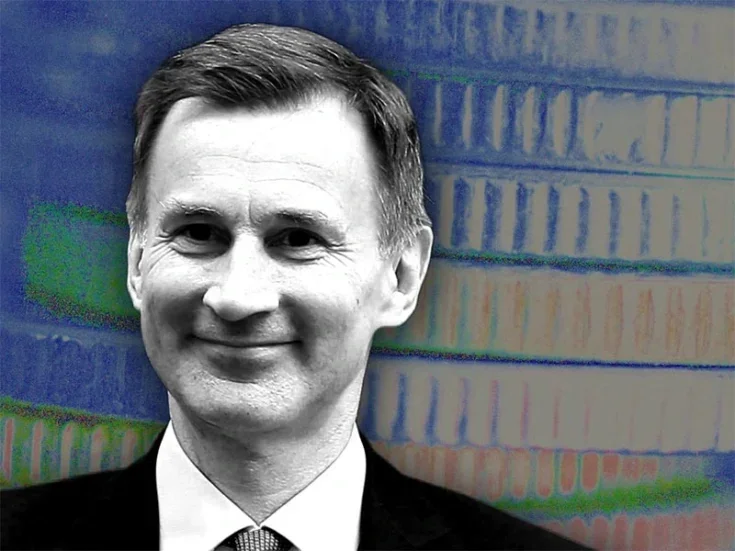
What would you say to the removal of government from the money-making process, along with the economists? Total madness, surely? Robert Hutchinson’s not so sure
NOBODY COULD HAVE predicted this,’ said Gordon Brown as financial markets collapsed around him in 2008. ‘We saved the world,’ he claimed a few days later, as he committed taxpayers to a lifetime of repaying other people’s debts. How much truth do these statements contain? And how much interest is there in truth, anyway?
What is true is that medical and technological advances improve our lives in uncountable ways. But behind this lies a deep sense that all is not well. Debt levels are high, prices are rising, education is poor, skill levels are low, unemployment is high, job prospects are poor, taxes are high. Following half a century of optimism it is dawning on many that they may suffer impoverishment and hardship in old age. Yet people seem poorly prepared. Was none of this foreseeable?
Against popular belief, there exists a school of economic thought that perfectly forecast the collapse of 2008 and the subsequent economic decline. Not only this, but it foresaw and explained the steps leading to it and has a clear view of the most likely future outcome. In this it is unique. This is the Austrian School and it stands directly opposed to the economic orthodoxy that is Keynesianism (after its architect John Maynard Keynes).
This school is not new. The fathers of Austrian thinking are Eugen von Böhm-Bawerk (1851-1914), Ludwig von Mises (1881-1973), Friedrich von Hayek (1899-1992) and Murray Rothbard (1926-1995). Their excellent writings both pre-date and follow Keynes.

Austrian economics is a practical discipline. It is based on the fact that humans engage in purposeful activity and it attempts to work out the logical implications of this. Fund managers versed in it have prospered in the past few years, even through the crash, while those with a traditional Keynesian training have incurred losses or even gone out of business. As this is the case, why have so few people heard of Austrian economics?
To understand its near-zero acceptance among traditional bodies of economics it helps to appreciate that a fundamental premise of the school is that economic ‘management’ through intervention by governments is unnecessary; in fact it is damaging to the economic well-being of most people (though crucially not all). Interventions trigger problems that require further policies. Economists’ interventions require economists’ solutions. By removing economic management you remove the need for economists.
It is understandable that economists working at banks, universities, the BBC, newspapers and government do not share these views — although importantly these are the entities Gordon Brown was referring to in the opening line of this article. By definition, they are unlikely to explain, as the Austrians do, that the financial crash resulted from previous government interventions, not an absence of them. It is this fact that made the event perfectly foreseeable.
Austrian economics is the economics of small government, free trade, balanced budgets, low government spending and honest money — money backed by gold. Above all it advocates that government should be removed from the money-making process since it cannot be trusted to act responsibly. Here it has much evidence. For example, the US Federal Reserve was created in 1913 to secure high levels of employment, to maintain the integrity of money and to support the banking system. It has failed in two out of three. US unemployment is officially nearly 10 per cent (in reality higher), but vitally, a 1913 dollar has fallen in purchasing power to 3 cents today, a 97 per cent loss in value over 98 years.
The Austrian School believes the free market provides the best money system, ie, the most stable. Consequently the price mechanism can function accurately to allocate resources efficiently. A market-determined interest rate treats savers and borrowers equally, together providing the best environment for achieving high growth of incomes and prosperity.
Such a situation prevailed in early form under gold coinage and, later (between 1815 and 1914), under the fully reserved gold standard. Money equalled weight of gold. This system required no government interference, no central bank and, as we have noted, no trained economists for its successful operation. The economy progressed in a two steps forward, one step back manner in which there were quick, short recessions but where overall rapid real growth was achieved.
Keynesianism is essentially the economics of inflation or, put differently, the economics of dishonest money. It is an offshoot of socialism. It is a school that operates under the pretence that it is possible to get rich at another’s expense for ever. The electorate likes this idea. Keynesianism confuses prosperity with consumption and debt with wealth. Since the electorate has been promised free goods and services, every year more money is spent than is raised and every year the shortfall requires new debt to be taken out and added to the previous debt. This is true in good and bad years. Old debts are almost never repaid other than with new replacement debts.
GOVERNMENTS ARE THE world’s largest debtors. Inflation is the debtor’s best friend. In real terms he can borrow 100 and repay three 98 years later. But to enable this trick the debtor must control the creation of money and must have a monopoly power in this. For this purpose he creates the central bank. But the mortal enemy of central banks is gold, because it cannot be produced easily and so restricts money expansion, so next he must detach money from gold. Then he must introduce legal tender laws forcing people to accept paper in transactions. Finally he needs a PR machine beginning in nursery school explaining why money expansion policies are good, why penalising savers is good, why falling consumer prices are bad and why anyone advocating a return to gold is a crank. If the debtor is a government, he can do all these things.

Debasing the money is not new. When the Roman Empire became too expensive to manage, the gold content of the denarius was progressively reduced from 95 per cent to 4 by adding base metals — the origin of the term. But to divert comparison with this blatant form of counterfeiting, Keynesianism attempts to justify its inflationary leanings with complex mathematical and econometric formulae and jargon such as ‘quantitative easing’. This is a decoy. It’s all really inflation and counterfeiting, just like the Romans.
Where Keynesianism deals with averages and equilibria, the Austrians deal with real relationships and real causation. The Austrian theory of the business cycle identifies that a boom in the economy is mainly caused by an increase in the supply of credit. The government and central bank do this through mechanisms including setting interest rates at low levels, purchasing government debt with newly created money and by the fractional reserving of banks.
The new money causes prices to rise as more pounds or dollars compete for each available good and service. Crucially, the new money does not reach all parts of the economy simultaneously. Some people receive it ahead of others and, importantly, ahead of the price rises. For these people, inflation is good. Don’t expect to see them supporting Austrian economics. To be in this fortunate position one must be as close to the money-making process as possible. Just as standing near the kitchen door at a drinks party assures plentiful warm canapés, so being part of the money-creation mechanism assures plentiful supplies for the participants. These are often big banks of the ‘too big to fail’ variety, but include other businesses that receive early payments of new cash, such as defence companies and NHS management consultants. And did we mention the ‘too big to fail’ banks?
As the new money spreads unevenly, price signals become distorted. Prices are the key indicators, showing market participants where capital and labour should be directed.
And so the boom causes errors, leading to wealth-sapping misallocations of capital called mal-investments.
The correction is inevitable. As the debts grow, at some point someone asks for their money back and it is this that precurses the collapse. The liquidation of debt forces the sale of assets and the destruction of wealth gathers pace.
Only further credit creation in increasing volumes can (temporarily) prevent the correction. This is what Keynesians advocate. Their response to the problems arising from too much debt is to incur more debt. But eventually the correction will reassert itself and the liquidation of debt will run its course. Only the owners of real (unmortgaged) things will emerge unscathed; when the dust settles it will settle on their land.
The amount of gold you can buy with a dollar has fallen from .04 ounce in 2001 to 0.008 of an ounce ten years later — an 80 per cent loss.
Cartoon by George Leigh








